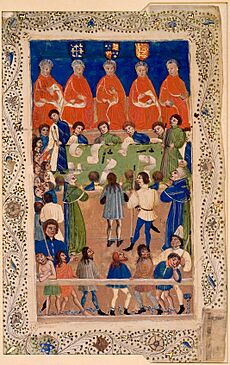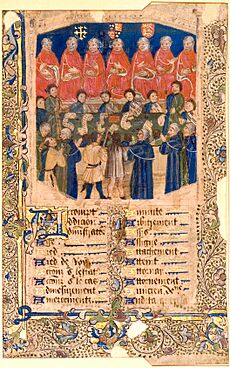Bill of Middlesex facts for kids
The Bill of Middlesex was a clever legal trick used a long time ago in England. It helped one important court, called the King's Bench, take on more cases. Normally, these cases belonged to another court, the Common Pleas.
Here's how the trick worked: The King's Bench had special power over cases in Middlesex, a county where the court was located. The Bill of Middlesex pretended that someone had done something wrong, like a minor offense called a trespass, in Middlesex. This allowed the King's Bench to arrest the person. Once the person was in court, the made-up trespass charge would be quietly dropped. Then, the court would deal with the real problem, like a debt or a dispute over property. This way, the King's Bench could handle cases that weren't usually its job.
This trick was part of a bigger effort by the King's Bench to get more business. It was much cheaper and faster than using the older methods of other courts, like the Court of Chancery. Because of this, the King's Bench became very popular, and the other courts lost business. The Bill of Middlesex was eventually stopped by a law called the Uniformity of Process Act 1832 in 1832.
The Bill of Middlesex and similar changes made the Common Pleas court very old-fashioned. This competition between courts eventually led to them all merging into one big court system in 1873.
Contents
Courts in Old England
From the 1200s until 1875, the Common Pleas and the King's Bench were two of the main courts in England. They handled different types of legal problems.
The Common Pleas court dealt with "common pleas." These were cases where the king wasn't directly involved. This usually meant arguments between ordinary people, like disputes over money or property. Most civil cases (non-criminal) went to this court.
The King's Bench court handled "pleas of the crown." These were cases that involved the king in some way. For example, serious crimes. The King's Bench also kept some special power over all cases in Middlesex. This was the county where the court was located.
Why Courts Changed
During the 1400s, the traditional courts started losing business. Newer courts, like the Court of Chancery, became more popular. These new courts were faster and simpler. They used easy methods to bring people to court.
From 1460 to 1540, the number of cases in the old common law courts dropped a lot. At the same time, cases in the newer courts increased. The King's Bench noticed this loss of business. Judges encouraged the court to find new ways to handle cases.
Around 1500, the King's Bench began to change its rules to get more cases and power. By 1550, things started to turn around for them. The Bill of Middlesex was one of these new ideas that helped the King's Bench.
The Bill of Middlesex Trick
The Bill of Middlesex used the King's Bench's special power over Middlesex. Before this trick, if you wanted to sue someone, you had to get a special document called a "writ." Different writs were needed for different types of problems.
For example, if someone owed you money, and also damaged your property, you would need separate writs for each problem. This took a lot of time and cost money. Also, you had to make sure the person you were suing actually showed up in court.
But there was a different way to start cases called "bills." Bills were usually used for court officials or prisoners already in court. If someone was already in court, you didn't need to make them appear again.
How the Trick Grew
So, a legal fiction (a made-up story) began. If you wanted to sue someone for debt and property damage, you would first get a writ for a minor offense, like trespass. The person would be arrested because of this trespass. Once they were in custody, the court would deal with the real problems (debt and property damage) using a bill.
Over time, it became even more of a trick. If you only wanted to sue someone for debt, you would still get a trespass writ. This trespass was completely made up. Once the person was arrested, the trespass charge would be quietly dropped. Then, the court would handle the debt case.
At first, you had to get the trespass writ from the Chancery court. But the King's Bench found an even shorter way. Since the King's Bench had special power over Middlesex, they would just say the made-up trespass happened in Middlesex. This allowed the King's Bench to issue its own arrest bill directly.
This became known as the Bill of Middlesex. It allowed the King's Bench to handle many civil cases. These cases would normally have gone to the Common Pleas.
Impact of the Bill
Because of changes like the Bill of Middlesex, the King's Bench's business grew very quickly. Between 1560 and 1640, the number of cases they handled increased tenfold. This new process was simple and cheap. It brought a lot of business to the King's Bench.
This had a bad effect on the Common Pleas and the Court of Chancery. Historically, cases now handled by the Bill of Middlesex belonged to the Common Pleas. They used a special writ from the Chancery. This writ was very expensive. It brought a lot of money to both the Chancery and the Common Pleas.
The cost of these writs depended on how much money was being claimed. For example, it cost 6 shillings and 8 pence to claim £40. It cost £5 to claim £1,000.
In response, the Chancery tried to stop people from using Bills of Middlesex. They issued "injunctions" (court orders to stop something). But these injunctions were only temporary. Once the fees were paid, there was nothing to stop the case from continuing in the King's Bench. Not many injunctions were issued, and they were easy to get around. The Chancery stopped issuing them around 1590. The Bill of Middlesex itself was finally ended by the Uniformity of Process Act 1832 in 1832.
Court Competition
The Bill of Middlesex was one of several big changes by the King's Bench. The Common Pleas court reacted by becoming very traditional. They were afraid of losing their own cases. A famous example of this struggle was Slade's Case. This case was about how to sue for a broken promise or contract.
Before this time, if someone owed you money, you had to use an old, difficult process in the Common Pleas. By 1558, lawyers found a new way through the King's Bench. This new way was called assumpsit. It was technically for "deceit" (trickery). The made-up story was that if someone promised to pay but didn't, they had tricked you.
The traditional Common Pleas court tried to overturn decisions made by the King's Bench on assumpsit. This caused a lot of tension between the courts. In Slade's Case, the head judge of the King's Bench, John Popham, purposely made the Common Pleas bring an assumpsit case to a higher court. This allowed the King's Bench judges to vote and win. This made assumpsit the main way to sue for broken contracts.
Eventually, the courts found a balance. But the result was three common law courts (the Exchequer of Pleas, Common Pleas, and King's Bench) that did almost the same things. By the 1700s, people often talked about the "twelve justices" of the three courts as if they were one.
In 1828, a politician named Henry Brougham complained in Parliament about this. He said that the King's Bench, which started with specific cases, now handled all kinds of cases. This was thanks to a legal trick that said everyone sued was already in the court's custody. He also said the Exchequer court, which handled tax cases, used a similar trick. They pretended everyone sued owed money to the king.
The end result of all these changes was the Supreme Court of Judicature Act 1873. This law combined the Common Pleas, Exchequer, King's Bench, and Chancery courts into one body. It was called the High Court of Justice. So, while the Bill of Middlesex helped the King's Bench for a while, it eventually led to its own court being merged into a larger system.
 | John T. Biggers |
 | Thomas Blackshear |
 | Mark Bradford |
 | Beverly Buchanan |



